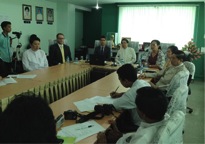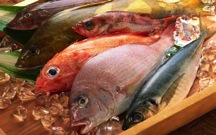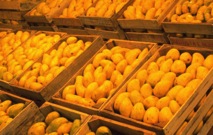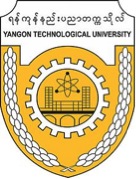Alastair Hicks
Introduction
U Zaw Min Win, Chairman of Myanmar Industries Association (MIA) and Myanmar Food Processors and Exporters Association (MFPEA), Daw Win Win Kyi, President of Food Science and Technology Association of Myanmar (FoSTAM), Justin Pau, General Manager of Bangkok Exhibition Services and Fraser Hawkes, Country Manager of Allworld Exhibitions, hosted a press conference to announce ProPak Myanmar 2014 − the first international processing and packaging trade event for the food, drink and pharmaceutical industries held in Myanmar.


ProPak Myanmar 2014 exhibition Press Conference at ProPak Myanmar
Myanmar’s Economic Growth
Myanmar’s economic growth is expected to pick up to an annual rate of 7.8% for the next two fiscal years (2014-15 and 2015-16), according to the press release of Asia Development Bank. The country’s economic growth for the fiscal year 2013-14 ending in March was estimated at 7.5%. ADB is keen to support investment in the energy, transport, urban, agriculture and social sectors such as education and health, to help build the foundations for inclusive growth (source: Xinhua).
Myanmar’s seafood exports are expected to rise this year as the European Union (EU) is planning to import farmed seafood products from Myanmar,following the removal of trade sanctions on the country. This would help the country boost seafood export, as reported by New Light of Myanmar newspaper. Myanmar produced 4.5Mt of seafood products including wild and farmed species in 2012, up from 4.1Mt in 2011. EU expects to become Myanmar’s next prospective seafood market (source: Xinhua).
Myanmar has earned more than $US350M from export of over 200,000 t of fisheries products in the past eight months of this fiscal year (2013-14), according to the Ministry of Livestock, Fisheries and Rural Development. The country has exported more than 96,000t of fisheries products through normal trade route and over 110,000t of the products through border trade routes during this period. In total, it is expected to earn $US700M from seafood export for the whole year (source: Eleven Weekly Media).


Myanmar’s fruit exports hit US$23M within the first two months of the fiscal year of 2013-14, according to the Ministry of Commerce. Myanmar has exported over 100,000t of mangoes, melons, dried plums and other fruits during the period. Over 70,000t of watermelons and 14,000t of mangoes were exported across land and sea trade routes, mainly to China and Singapore. In the past, Myanmar exported most of its fruits to China. However, over the last three years it has started to target new markets in Singapore, Malaysia and Thailand as well as participate in international fruit festivals around the world (source: Eleven Weekly Media).
Myanmar breweries: Denmark-based Carlsberg and its partner Myanmar Golden Star (MGS) will begin operating their first factory by the end of 2014, according to MGS Company. The company is planning to export a million cans of beer (Myanmar beer) per month to Europe. Carlsberg owns 51% of Myanmar Carlsberg Co. Ltd, and MGS owns 49%. The initial investment is believed to be US$35-50M. Carlsberg is a Danish brewing company located in Copenhagen, Denmark. In 2009 it was the 4th largest beer company in the world (source: Myanmar Business Network).
The First National Conference
The forst national conference was held on the Development of Food Science and Technology in Myanmar, from 4-6 September 2014 at Myanmar Convention Centre, Yangon. It provided opportunities to meet and share experiences as well as strengthen networking among international food scientists and scientists in related fields from academia, government and food industries. The theme, Food Science and Technology Issues in Myanmar, highlighted significant developments in applications of food science and technology, with an emphasis on food product quality and safety. The conference featured a series of presentations and discussions in plenary and poster sessions, informal gatherings, and equipment exhibitions.
Day 1 Thursday 4 September: The opening session was launched by Ministers His Excellency U Nyan Tun, Ministry of Electric Power and Industry, Science and Technology, and His Excellency U Than Myint, Ministry of Economics Planning and Commerce, from the Yangon Regional Government.
An opening address was presented by U Zaw Min Win, Chairman of Myanmar Industries Association (MIA) and Myanmar Food Processors and Exporters Association (MFPEA). A welcome to all distinguished delegates was made by Justin Pau, General Manager of Bangkok Exhibition Services. The speeches highlighted that ProPak Myanmar 2014 presented over 185 exhibitors from 23 countries, three international pavilions from Singapore, Taiwan and Thailand, and over 1500 trade visitors per day visited the exhibition and conference.
Other talks included:
Day 2 Friday 5 September: Speakers on the second day included:
A Panel Q&A session on all these technical subjects was then held with all speakers present on stage, a very lively session with many technical issues raised and answered.
The closing words were spoken by U Sein Thaung Oo, Committee Member of FoSTAM. Press conferences were then held by the speakers with members of the local media.


Members of the Executive Committee with Daw Win Win Kyi, President of FoSTAM, Prof Pingfan Rao Past President IUFoST, Darunee Edwards, President of FoSTAT with visiting Professor Alastair Hicks, both Honorary Fellows of FoSTAM, at the opening of the Conference, and later enjoying the ambiance of the Schwedagon Pagoda in Yangon
Day 3 Saturday 6 September: Yangon Technological University (YTU), located in Gyogone, Yangon, is the premier engineering university of Myanmar. Established as a Department of Engineering under Rangoon University in 1924, YTU is the country’s oldest and largest engineering university, and one of the most selective universities in Myanmar. The university offers bachelor, master and doctorate degree programs in engineering disciplines to nearly 8000 students. YTU is a member of ASEAN University Network, Southeast Asia Engineering Education Development Network (AUN/SEED-Net), and Greater Mekong Sub-Region Academic and Research Network (GMSARN).


Yangon Technological University
Most YTU students are enrolled full-time in 18 engineering academic programs, over 2000 students are also enrolled in part-time programs. Of the nearly 11000 students who graduated between 1997 and 2004, over 50% received bachelor degrees, 10% master, 4.5% postgraduate diploma, 32.5% undergraduate diploma, and 2.4% PhD. The International speakers, along with members of the Executive Council of FoSTA Myanmar, were invited to meet the professors and staff of Yangon Technological University, Ministry of Science and Technology, to discuss curriculum issues in food science and technology. They first met with the Rector (ret’d), now Technical Expert to the university, then a round table meeting was held. The IUFoST Guidelines for recognition of Curricula in Food Science were introduced to the assembled academic staff at the meeting and a lively discussion followed, in anticipation of a new Department of Food Process Engineering to be established in 2015 at the University.
Dr Alastair Hicks is an Honorary Fellow of the Food Science and Technology Association of Myanmar (FoSTAM), a Life Member of the Food Science and Technology Association of Thailand (FoSTAT), an elected Fellow of the International Academy of Food Science and Technology (IAFoST), and Life Fellow of the Australian Institute of Food Science and Technology (AIFST). He was the Senior FAO Regional Officer for Agroindustries and Postharvest with the FAO / UN Regional Office for Asia and Pacific (Thailand) for over 20 years following earlier work as a Food Industries Officer with FAO / UN (Rome). He maintains strong interests in international education and professional development, and is an African – born Australian citizen living in Thailand; e-mail: alastairhicks@gmail.com
IUFoST Scientific Information Bulletin (SIB)
FOOD FRAUD PREVENTION